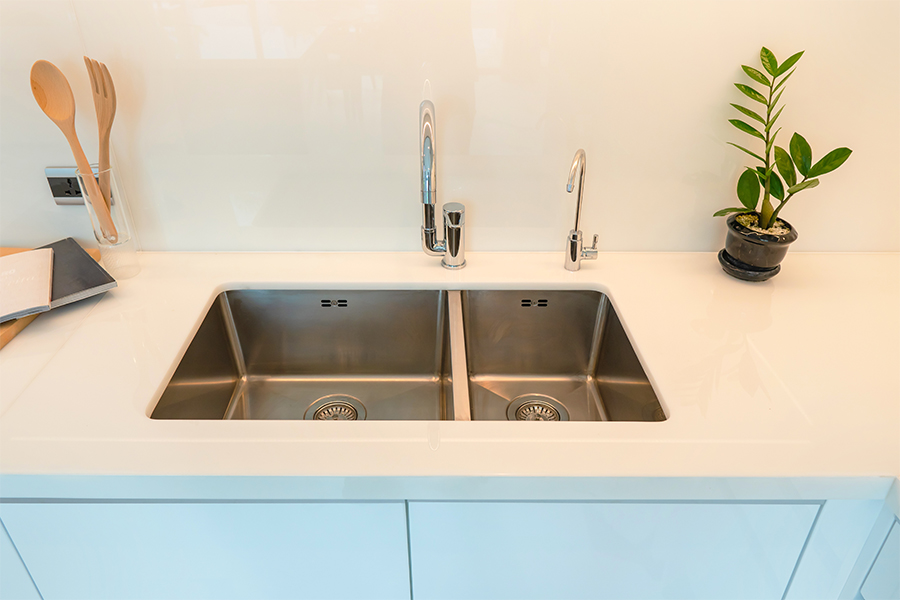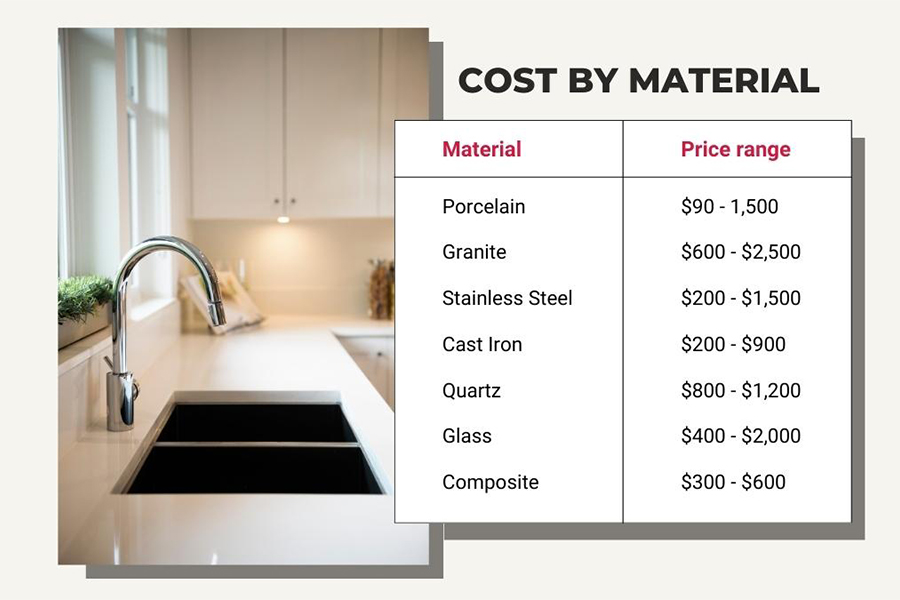Sink Success: Mastering the Art of Kitchen Sink Installation for a Stylish Upgrade

Article Highlights
• Cost Breakdown: Sink, faucet, labor, materials, hardware, accessories, and modifications are all factors that will be considered.
• Cost by Sink Style: Homeowners can expect to pay from $100 to $1,500 based on the style of sink chosen.
• Cost by Material: Depending on the material selected for the kitchen sink, anywhere from $90 to $2,000 needs to be budgeted.
• DIY Kitchen Sink Installation: DIY cost range: $100 to $2,000 or more. Savings on labor, but materials, sink, faucet, and modifications contribute to the expense.
Kitchen Sink Installation – A Cost Breakdown
Several key components need to be considered regarding the overall cost and budget you set for a new kitchen sink. The price of the sink, faucet, and labor are crucial aspects of the project cost.
• Sink - The cost of the sink itself will fluctuate based on the style and material you select. You will pay anywhere from $90 to $2,000 for your new sink. Your cost will stay lower for a more basic stainless-steel kitchen sink. However, if you opt for something like granite or glass, you can expect to pay more for that designer look and feel.

• Faucet – Next on the list is the faucet. Your basic tap will only set you back approximately $50, while a custom faucet or more intricate one can cost hundreds.

• Installation Labor – Labor costs will depend significantly on whether you hire a professional to oversee the kitchen sink installation or do it yourself. If you decide to DIY it, the labor will be free. However, if you would rather entrust the process to a professional, you can expect to pay around $200 and $500 on average.

• Installation Materials – Supplies needed for this process are affordable yet must be considered in this cost breakdown. To install, you will need materials such as sealants, adhesives, and items to secure the sink in place.
• Hardware and Accessories – For an additional cost that will run you anywhere from $10-$100, you can elevate your kitchen sink setup. From top-of-the-line garbage disposals to chic soap dispensers, your spending will depend on how many accessories or additional luxury hardware you want to add.

• Modifications (if needed) - If you are doing a complete overhaul of your kitchen, where the plumbing needs to be rerouted or new connections need to be made, this will be an additional cost. A professional can provide you with an estimate for this if required.
Cost by Sink Style
• Farmhouse - exudes rustic charm, the cost may range from $300 to $1,000, depending on the material, with additional expenses for professional installation.
• Undermount Sink - known for their seamless integration with the countertop, typically cost between $200 and $800.
• Drop-In - an affordable and easy-to-install option, ranges from $100 to $500.
• Double Basin - offers versatility in dishwashing, prices vary between $250 and $1,200.
• Single Bowl - known for its simplicity, may cost between $100 and $800.
• Double Bowl - sinks provide separate spaces for various tasks, typically ranging from $200 to $1,000.
• Vessels - are a stylish and unique choice, running from $100 to $800, based on the material.
• Wall-Mounted - save floor space, usually ranges from $200 to $1,000.
• Bar - designed for smaller spaces, comes in for $100 to $500.
Remember that these estimates are approximate and may vary based on material quality, brand, and installation complexity. Consider the function and design of the chosen sink style while accounting for the associated costs.
Cost by Material

Additional Costs Involved
In addition to the primary expenses, several other considerations may contribute to installing a kitchen sink. Customization requirements, such as the need for a tailor-made countertop cutout or specialized fittings, can lead to additional charges ranging from $100 to $500. If upgrading to a more intricate sink style, like a touchless or high-arc faucet, expect to allocate an extra $150 to $500 for these modern conveniences. Delivery fees for the sink, especially if it's of considerable size or weight, can range from $50 to $150.
Furthermore, if your kitchen cabinets or plumbing require adjustments to accommodate the new sink, carpentry or plumbing services may be necessary, which could cost $100 to $300. Always account for any permits that may be required in your local area, as permit fees can vary but typically fall within the $50 to $200 range. Considering these potential supplemental costs, you can ensure a more comprehensive and accurate kitchen sink installation budget.
DIY Kitchen Sink Installation Cost
If you decide to take on this project yourself, as a DIY enthusiast or someone just looking to save money, there are still costs to consider. While you will not need to pay for the labor of a professional, the materials for installation, sink and faucet, and any modifications that need to be made for an accurate fit and water flow will need to be paid for.
In that case, a kitchen sink installation cost will range significantly from $100-$2,000 or more based on the style of sink and material chosen. Tackling this as a DIY will save you on the labor side. However, things can quickly add up if you run into any challenges. Keep that in mind before deciding to begin.
How to Install a Kitchen Sink - FAQ
1. How long does kitchen sink installation take?
The duration of kitchen sink installation varies based on aspects such as the complexity of the structure, the type of sink, and any additional features. On average, a professional installation may take 1 to 4 hours. DIY installations might take longer, depending on the installer's experience and the intricacies of the plumbing and countertop adjustments.
2. How much does it cost to pipe a kitchen sink?
The cost to pipe a kitchen sink depends on various factors, including the complexity of the plumbing system, local labor rates, and the materials used. On average, the cost of professional plumbing installation can range from $200 to $500. DIY costs may be lower, but it's crucial to consider the expertise required to ensure proper installation and avoid potential issues.
3. Do you need a plumber to install a kitchen sink faucet?
While some homeowners with plumbing experience may attempt a DIY installation, hiring a professional plumber to install a kitchen sink faucet is generally advisable. Plumbers have the expertise to handle potential complications, ensure proper connections, and prevent leaks. Professional kitchen sink installation reduces the risk of damaging the faucet or the plumbing system.
4. How often do you need to replace kitchen sink pipes?
The lifespan of kitchen sink pipes depends on factors such as the material of the lines, water quality, and usage patterns. Generally, high-quality pipes can last 20 years or more, but older homes with galvanized steel pipes may require more frequent replacements. Signs of corrosion, leaks, or reduced water flow indicate the need for inspection and potential replacement.
5. Can you replace the kitchen sink without replacing the countertops?
Yes, replacing a kitchen sink without replacing the countertops is possible. The key is choosing a new sink that fits within the existing countertop cutout. Ensure the dimensions match and the unique sink style aligns with the current plumbing setup. While this is a feasible DIY project for some, consulting with a professional may still be advisable to ensure a proper fit and address any unexpected challenges.
6. What equipment is needed to install a kitchen sink?
Installing a kitchen sink usually requires several tools and materials, including an adjustable wrench, pipe wrench, plumber's tape, a screwdriver, a bucket, a hacksaw, and a putty knife. A plumber's putty or silicone caulk is also needed to create a watertight seal. The specific tools required may vary based on the type of sink and the complexity of the installation, so it's essential to review the sink manufacturer's guidelines and consult any relevant plumbing codes in your area.







